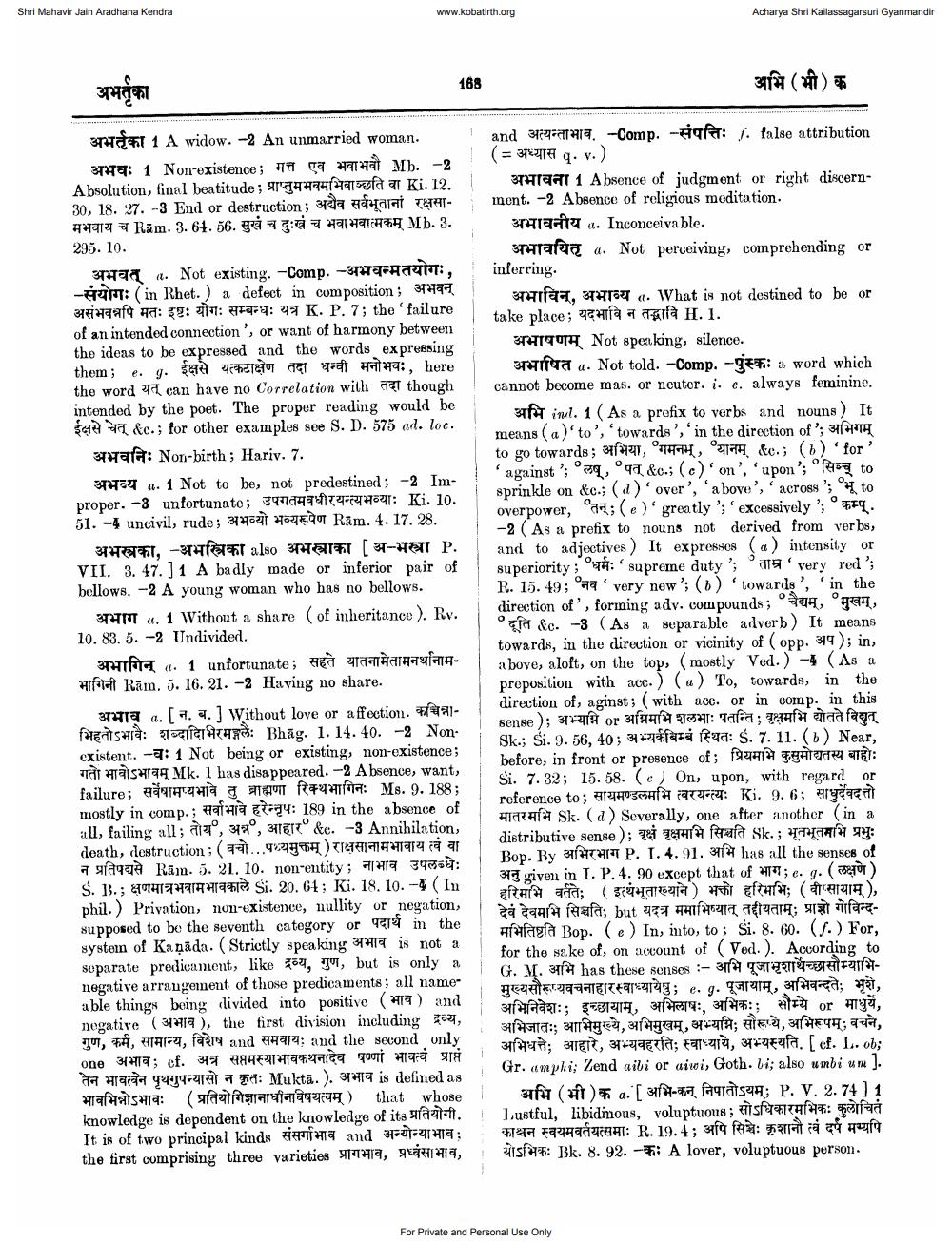________________
Shri Mahavir Jain Aradhana Kendra
www.kobatirth.org
Acharya Shri Kailassagarsuri Gyanmandir
अभर्तृका
168
अभि (भी)क
अभर्तृका 1 A widow. -2 An unmarried woman. ।
अभवः 1 Non-existence; मत्त एव भवाभवी Mb. -2 Absolution, final beatitude%3; प्राप्तुमभवमभिवाञ्छति वा Ki. 12. 30, 18.27. -3 End or destruction; अद्यैव सर्वभूतानां रक्षसामभवाय च Ram. 3.64.56. सुखं च दुःखं च भवाभवात्मकम् Mb. 3. 295.10.
अभवत् .. Not existing. -Comp. -अभवन्मतयोगः, -संयोगः (in Rhet.) a defect in composition; अभवन् असंभवन्नपि मतः इष्टः योगः सम्बन्धः यत्र K. P.73; the "failure of an intended connection', or want of harmony between the ideas to be expressed and the words expressing them; eg. ईक्षसे यत्कटाक्षेण तदा धन्वी मनोभवः, here the word 47 can have no Correlation with a though intended by the poet. The proper reading would be sa &c.; for other examples see S. D. 575 ad. loc.
अभवनिः Non-birth; Hariv. 7.
अभव्य 1.1Not to be, not predestined; -2 Improper. -3 unfortunate; उपगतमवधीरयन्त्यभव्याः Ki. 10. 51.-4 uncivil, rude; अभव्यो भव्यरूपेण Ram.4.17.28.
अभस्त्रका, -अभस्त्रिका also अभस्त्राका [अ-भस्त्रा P. VII. 3. 47.]1 A badly made or inferior pair of bellows. -2 A young woman who has no bellows.
THAM «. 1 Without a share (of inheritance). Rv. 10.83.5. -2 Undivided.
अभागिन् ... 1 unfortunate; सहते यातनामेतामनानामHafta Rām. 0. 16. 21.-2 Having no share. __ अभाव.[न. ब.] Without love or affection. कच्चिन्नाभिहतोऽभावैः शब्दादिभिरमङ्गलैः Bhag. 1. 14.40. -2 Nonexistent. -व:1 Not being or existing, nom-existence%3; गतो भावोऽभावम् Mk. I has disappeared. -2 Absence, want, failure; सर्वेषामप्यभावे तु ब्राह्मणा रिक्थभागिनः Ms.9.1883 mostly in comp.3; सर्वाभावे हरेन्नृपः 189 in the absence of all, failing all; तोय, अन्न, आहार" &c. -3 Annihilation, death, destruction; (वचो...पथ्यमुक्तम् ) राक्षसानामभावाय त्वं वा न प्रतिपद्यसे Ram.5.21. 10. non-entity; नाभाव उपलब्धेः S. B.; क्षणमात्रभवामभावकाले Si. 20.64; Ki. 18. 10.-4 (In phil.) Privation, non-existence, nullity or negation, supposed to be the seventh category or 970 in the system of Kaņāda. (Strictly speaking 37919 is not a separate predicament, like द्रव्य, गुण, but is only a negative arrangement of those predicaments; all name able things being divided into positive (भाव) and negative (37419 ), the first division including 282, गुण, कर्म, सामान्य, विशेष and समवायः and the second only one अभाव; ef. अत्र सप्तमस्याभावकथनादेव पणां भावत्वं प्राप्त तेन भावत्वेन पृथगुपन्यासो न कृतः Mukta.). अभाव is defined as भावभिन्नोऽभावः (प्रतियोगिज्ञानाधीनविषयत्वम् ) that whose | knowledge is depondent on the lnowledge of its प्रतियोगी, It is of two principal kinds संसगांभाव and अन्योन्याभाव: the tirst comprisiny three varieties प्रागभाव, प्रध्वंसाभाव, ।
and अत्यन्ताभाव, -Comp. -संपत्तिः / talse attribution (= अध्यास q.v.)
अभावना 1 Absence of judgment or right discernmont. -2 Absence of religious moditation.
अमावनीय .. Inconceiva ble.
अभावयित् a. Not perceiving, comprehending or inferring.
अभाविन, अभाव्य 1. What is not destined to be or take place ; यदभावि न तद्भावि H. 1.
अभाषणम् Not speaking, silence.
अभाषित a. Not told. -Comp. -पुंस्कः a word which cannot become mas. or neuter. i. e. always feminine.
अभि int. 1 (As a prefix to verbs and nouns) It means (a) to', "towards', 'in the direction of'; अभिगम् to go towards; अभिया, गमनम् , यानम् &c. (B) for' 'against'; °लष् , °पत् &c.; (c) 'on', 'upon'; °सिञ्च् to sprinkle on &c.; (a) 'over', 'above', ' across '; o to overpower, तन्; (e)'greatly'; 'excessively'; °कम्प्. -2 (As a prefix to nouns not derived from verbs, and to adjectives) It expresses (a) intensity or superiority; "धर्मः 'supreme duty'; 'ताम्र ' very red'; R. 15.49; 'नव 'very new'; (b) 'towards', ' in the direction of', forming adv. compounds; °चैद्यम्, मुखम् , °दूति &c. -3 (As a separable adverb) It means towards, in the direction or vicinity of (opp. अप); in, above, aloft, on the top, mostly Ved.) -4 (As a preposition with acc.) (a) To, towards, in the direction of, aginst; with acc. or in comp. in this sense); अभ्यग्नि or अग्निमभि शलभाः पतन्ति ; वृक्षमभि द्योतते विद्युत् Sk.; Si.9.56,40; अभ्यर्कबिम्बं स्थितः5.7.11. (B) Near, before, in front or presence of ; प्रियमभि कुसुमोद्यतस्य बाहोः Si.7.32; 15.58. (८) On, upon, with regard or reference to; सायमण्डलमभि त्वरयन्त्यः Ki.9.6% साधुर्देवदत्तो मातरमभि Sk. (d) Severally, one after another (in a distributive sense); वृक्ष वृक्षमाभ सिञ्चति Sk. भूतभूतमभि प्रभुः Bop. By अभिरभाग P. I.4.91. अभि has all the senses ot अनु given in I. P.4.90 except that of भाग; e.g.(लक्षणे) हरिमभि वर्तते; (इत्थंभूताख्यान) भक्तो हरिभाभिः (वीप्सायाम् ), देवं देवमाभि सिञ्चति; but यदत्र ममाभिष्यात् तद्दीयताम् ; प्राज्ञो गोविन्दAfafagfa Bop. (e) In, into, to ; Si. 8. 60. (f.) For, for the sake of, on account of (Ved.). According to G. M. अभि has these senses :- अभि पूजाभृशार्थेच्छासौम्याभिमुख्यसौरूप्यवचनाहारस्वाध्यायेषु; e.g. पूजायाम् , अभिवन्दते; भृशे, अभिनिवेशः; इच्छायाम्, अभिलाषः, अभिकः; सौम्ये or माधुये, अभिजातः; आभिमुख्ये, अभिमुखम्, अभ्याग्निः सौरूप्ये, अभिरूपम: वचने, अभिधत्ते; आहारे, अभ्यवहरति; स्वाध्याये, अभ्यस्यति. [ef. L.ob; Gr. amphi; Zend aibi or aiwi, Goth. bi; also umbi um ).
अभि (भी)क.[अभि-कन् निपातोऽयम्; P.V.2.7411 Lustful, libidimous, voluptuous; सोऽधिकारमभिकः कुलोचितं काश्चन स्वयमवर्तयत्समाः R.19.4; अपि सिञ्चः कृशानौ त्वं दर्प मम्यपि योऽभिक: Bk.8.92.-क: A lover, voluptuous person.
For Private and Personal Use Only




